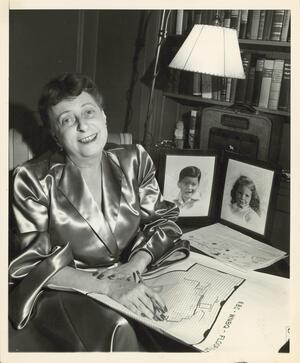Irna Phillips
Irna Phillips created hugely popular soap operas for radio and television and introduced plotlines that shaped the format of many soaps that followed. Phillips dreamed of becoming an actress and taught English while working at a Chicago radio station on her summer breaks. In 1930, she created one of the first radio soap operas, Painted Dreams, and in the 1940s she created five more soaps, including Guiding Light, which became the first radio serial to successfully transfer to television. Phillips was known for her cliffhanger endings and her use of organ music and was one of the first to utilize the plot devices of the amnesiac and the murder trial. She went on to write for other soap operas, including As the World Turns and Days of Our Lives.
Early Life and Education
Millions of people helped popularize the radio and television soap operas created by scriptwriter Irna Phillips. Born in Chicago, Illinois, on July 1, 1901, to William S. and Betty (Buxbaum) Phillips, she had nine older siblings. Her father, a grocer born to Polish immigrant parents, died when Irna was eight years old, leaving her mother, a Jewish immigrant from Germany, to keep the large family together with income from several rental properties.
A sickly and sensitive child, Phillips sought refuge in books and a world of make-believe. She attended public schools in Chicago before matriculating at Northwestern University in 1918. The following year, she transferred to the University of Illinois, where the aspiring actor studied drama. When an acting position failed to materialize, Phillips took her B.S. in education in 1923 and embarked on a teaching career. With the exception of one year of graduate study at the University of Wisconsin, she spent the next seven years teaching English, public speaking, and drama at a junior college in Fulton, Missouri, and at a teachers’ college in Dayton, Ohio.
Radio Career
During summer vacations, Phillips worked without pay for radio station WGN in Chicago. She briefly hosted the inspirational program A Thought for Today before turning her attention to scriptwriting. In 1930, she created Painted Dreams, one of the earliest radio soap operas. Phillips and another woman played the parts for the serial’s six characters and provided the sound effects. The program’s immediate popularity encouraged Phillips, who became eager for network sponsorship. When WGN refused to give Phillips the rights to Painted Dreams, she simply created a new program, Today’s Children, which aired on NBC beginning in 1932. Both serials featured a wise motherly character, modeled on Betty Buxbaum Phillips. Phillips retired this highly popular serial in 1938, shortly after her mother’s death.
Working with a full-time secretary and staff of writers and researchers, Phillips produced five daytime serials during the early 1940s. Among her most popular radio soap operas were The Guiding Light, Woman in White, The Right to Happiness, Lonely Women, and The ‘New’ Today’s Children. Known for her trademark cliff-hangers, the use of organ music to create moods, and the “crossover” (when characters from one show appeared on another), she was among the first scriptwriters to utilize the amnesia victim and the murder trial. Shunning sensationalism, Phillips preferred to focus on real-life families as they coped with such socially significant issues as juvenile delinquency during World War II, the adjustments of returning war veterans, adultery, adoption, and divorce. In contrast with other radio soap operas, which typically endorsed traditional visions of domesticity and femininity, Phillips’s serials frequently conveyed the complexities of modern women’s choices.
Beyond the Airwaves
Television brought an end to many of radio’s soap operas, but Phillips proved adaptable to the new format. Her first effort (These Are My Children) flopped, but in 1952, The Guiding Light became the first daytime radio serial to make the transition to television. Phillips also wrote for such programs as The Brighter Day, The Road to Life, As the World Turns, Another World, Days of Our Lives, and Love Is a Many Splendour’d Thing. In 1964, she also served as a consultant for the prime-time series Peyton Place.
Phillips, who never married, adopted two children, Thomas Dirk (b. 1941) and Katherine Louise (b. 1943). Phillips suffered a heart attack and died in Chicago on December 23, 1973.
Current Biography Yearbook (1943, 1974).
“Irna Phillips, 72, Serials Writer.” NYTimes, December 30, 1973, 31:1.
“Life as a Soap Opera: The Story of Irna.” Chicago Daily News, January 12, 1974.
NAW modern.
Phillips, Irna. Papers. State Historical Society of Wisconsin, Madison.
“Script Queen.” Time 35 (June 10, 1940): 66+.
“Writing On: Irna Phillips Mends with Tradition.” Broadcasting 83 (November 6, 1972): 75.
WWWIA (1974–1976).
Wyden, Peter. “‘As the World Turns’ They Suffer and Suffer.” Saturday Evening Post (June 25, 1960), 30+.




